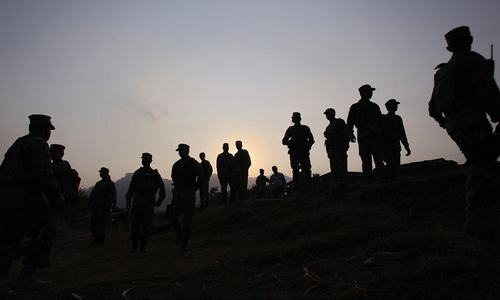ISLAMABAD: Top military intelligence officials on Tuesday briefed the parliamentary leaders on the working of military courts to remove their apprehensions about the judicial system under the army’s supervision.
The absence of representatives of the Jamiat Ulema-i-Islam (JUI-F) and Pakhtunkhwa Milli Awami Party (PkMAP) — the two government allies — from the in-camera briefing was conspicuous.
Later, the opposition parties criticised the ruling Pakistan Muslim League-Nawaz for not taking their coalition partners into confidence before approaching them for a consensus.
When the opposition parties have not yet made any categorical comment on revival of military courts, the JUI-F and the PkMAP are openly opposing the government’s plan.
Tuesday’s meeting, which had been specially convened for the briefing, was presided over by National Assembly Speaker Ayaz Sadiq and also attended by Finance Minister Ishaq Dar and Law Minister Zahid Hamid.
The briefing was given by the outgoing and incoming heads of the Military Intelligence (MI). Officials of the Inter-Service Intelligence were also present.
Earlier, the opposition parties had rejected the two briefings on the same issue given by the law minister.
During the last such meeting on Jan 31, the parties had agreed to meet again on Feb 16. The opposition parties had asked the government to provide a roadmap of its plan to carry out judicial reforms and structural changes in the criminal justice system before seeking their cooperation for reviving military courts.
Military courts were established and granted permission to try civilians accused of terrorism in January, 2015, after the terrorist attack on the Army Public School in Peshawar in December, 2014. The courts were given a two-year constitutional cover as both houses of the parliament passed the 21st Amendment in the Constitution despite fears among lawmakers that the establishment of military courts might undermine democracy in the country.
The courts have been non-functional since Jan 7 after expiry of the two-year constitutional cover.
The government now wants a two-year extension for the military tribunals. Although the opposition parties, including the Pakistan Peoples Party, the Pakistan Tehreek-i-Insaf (PTI), Jamaat-i-Islami and the Awami National Party (ANP), disagree with the government’s point of view, they are keeping the option of talks open on the issue.
Talking to Dawn, PTI vice-chairman Shah Mehmood Qureshi termed the briefing “satisfactory”, saying the MI officials with the ranks of major-general gave replies to their questions in a “polite and dignified manner”.
However, he criticised the government for its failure to take its allies on board on the issue. He said that he had also questioned the absence of the interior minister from such important briefings.
The PTI leader said the opposition was waiting for the Feb 16 meeting in which the government had promised to provide a complete roadmap about its future plan.
He said the government had failed to carry out judicial reforms as promised by it at the time of seeking the political parties’ support for establishment of military courts.
Mr Qureshi said the parties had agreed that a parliamentary committee would be constituted to monitor and oversee the implementation of the government’s plan to introduce judicial and structural reforms in the country.
Moreover, he said, the opposition wanted that any decision on military courts should be taken at the highest forum and Prime Minister Nawaz Sharif should convene a multi-party conference for this purpose.
Speaking to reporters after the meeting, Speaker Ayaz Sadiq expressed the hope that the issue would be resolved in the next one or two meetings. He said the final decision on the matter would only be made through developing a national consensus.
Published in Dawn February 8th, 2017














































Dear visitor, the comments section is undergoing an overhaul and will return soon.